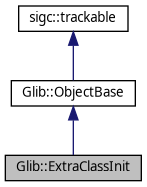A convenience class for named custom types. More...
#include <glibmm/extraclassinit.h>

Protected Member Functions | |
| ExtraClassInit (GClassInitFunc class_init_func, void * class_data=nullptr, GInstanceInitFunc instance_init_func=nullptr) | |
| Constructor. More... | |
 Protected Member Functions inherited from Glib::ObjectBase Protected Member Functions inherited from Glib::ObjectBase | |
| ObjectBase () | |
| This default constructor is called implicitly from the constructor of user-derived classes, even if, for instance, Gtk::Button calls a different ObjectBase constructor. More... | |
| ObjectBase (const char * custom_type_name) | |
| A derived constructor always overrides this choice. More... | |
| ObjectBase (const std::type_info & custom_type_info) | |
| This constructor is a special feature to allow creation of derived types on the fly, without having to use g_object_new() manually. More... | |
| ObjectBase (ObjectBase && src) noexcept | |
| ObjectBase & | operator= (ObjectBase && src) noexcept |
| virtual | ~ObjectBase () noexcept=0 |
| void | initialize (GObject * castitem) |
| void | initialize_move (GObject * castitem, Glib::ObjectBase * previous_wrapper) |
Additional Inherited Members | |
 Public Member Functions inherited from Glib::ObjectBase Public Member Functions inherited from Glib::ObjectBase | |
| ObjectBase (const ObjectBase &)=delete | |
| ObjectBase & | operator= (const ObjectBase &)=delete |
| void | set_property_value (const Glib::ustring & property_name, const Glib::ValueBase & value) |
| You probably want to use a specific property_*() accessor method instead. More... | |
| void | get_property_value (const Glib::ustring & property_name, Glib::ValueBase & value) const |
| You probably want to use a specific property_*() accessor method instead. More... | |
| template<class PropertyType > | |
| void | set_property (const Glib::ustring & property_name, const PropertyType & value) |
| You probably want to use a specific property_*() accessor method instead. More... | |
| template<class PropertyType > | |
| void | get_property (const Glib::ustring & property_name, PropertyType & value) const |
| You probably want to use a specific property_*() accessor method instead. More... | |
| template<class PropertyType > | |
| PropertyType | get_property (const Glib::ustring & property_name) const |
| You probably want to use a specific property_*() accessor method instead. More... | |
| sigc::connection | connect_property_changed (const Glib::ustring & property_name, const sigc::slot< void()> & slot) |
| You can use the signal_changed() signal of the property proxy instead. More... | |
| sigc::connection | connect_property_changed (const Glib::ustring & property_name, sigc::slot< void()> && slot) |
| You can use the signal_changed() signal of the property proxy instead. More... | |
| void | freeze_notify () |
| Increases the freeze count on object. More... | |
| void | thaw_notify () |
| Reverts the effect of a previous call to freeze_notify(). More... | |
| virtual void | reference () const |
| Increment the reference count for this object. More... | |
| virtual void | unreference () const |
| Decrement the reference count for this object. More... | |
| GObject * | gobj () |
| Provides access to the underlying C GObject. More... | |
| const GObject * | gobj () const |
| Provides access to the underlying C GObject. More... | |
| GObject * | gobj_copy () const |
| Give a ref-ed copy to someone. Use for direct struct access. More... | |
Detailed Description
A convenience class for named custom types.
Use it if you need to add code to GType's class init function and/or need an instance init function. Example:
The callback functions (my_extra_class_init_function() and my_instance_init_function() in the example) are called from GLib (a C library). They shall have C linkage. (Many compilers accept callback functions with C++ linkage, but such a program has undefined behavior.)
If you want the functions with C linkage to have internal linkage, they must be declared 'static', even if they are defined in an anonymous namespace. The compiler respects namespace declarations of functions with C linkage, but the linker does not.
- Note
- Classes derived from ExtraClassInit (MyExtraInit in the example) must be listed before Glib::Object or a class derived from Glib::Object (Gtk::Widget in the example) in the list of base classes.
Constructor & Destructor Documentation
◆ ExtraClassInit()
|
explicitprotected |
Constructor.
- Parameters
-
class_init_func Pointer to an extra class init function. nullptr, if no extra class init function is needed. class_data Class data pointer, passed to the class init function. Can be nullptr, if the class init function does not need it. instance_init_func Pointer to an instance init function. nullptr, if no instance init function is needed.